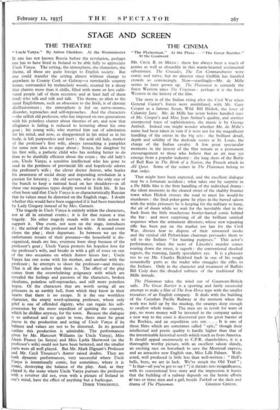THE CINEMA
" The Plainsman." At the Plaza " The Great Barrier."
At the Gaumont
MR. CECIL B. DE MILLE : there has always been a touch of genius as well as absurdity in this warm-hearted sentimental salvationist. The Crusades, The Ten Commandments were comic and naive, but no director since Griffith has handled crowds so convincingly. Now—startlingly—Mr. de Mille seems to have grown up. The Plainsman is certainly the finest Western since The Virginian : perhaps it is the finest Western in the history of the film.
The story is of the Indian rising after the Civil War when General Custer's forces were annihilated, with Mr. Gary Cooper as a famous Scout, Wild Bill Hickok, the lover of Calamity Jane. Mr. de Mille has never before handled stars of Mr. Cooper's and Miss Jean Arthur's quality, and another unexpected trace of sophistication, the music is by George Antheil. Indeed one might wonder whether Mr. de Mille's name had been taken in vain if it were not for the magnificent handling of the extras in the big sets : the brilliant detail, depth and solidity of the dockside scenes at St. Louis, the charge of the Indian cavalry. A few great spectacular moments in the history of the film remain as a permanent encouragement to those who believe that an art may yet emerge from a popular industry : the long shots of the Battle of Bull Run in The Birth of a Nation, the French attack in All Quiet. Some of the scenes in The Plainsman belong to that order.
That might have been expected, and the excellent dialogue may be a fortunate accident ; what takes one by surprise in a De Mille film is the firm handling of the individual drama : the silent moments in the cleared street of the shabby frontier town when Hickok crosses the road to meet his would-bc murderers : the final poker game he plays in the barred saloon with the white prisoners he is keeping for the military to hang, the air of• doom while we wait for the inevitable shot in the back from the little treacherous bowler-hatted comic behind the bar : and most surprising of all the brilliant satirical sequence when the armament directors, whose new repeating rifle has been put on the market too late for the Civil War, discuss how to dispose of their unwanted stocks and the cynical old Pickwickian chairman persuades them to sell to the Indians " for hunting purposes." This actor's performance, when the news of Lincoln's murder comes roaring down the street, is superb : the conventional shocked regrets, the roaming, faintly speculative eye. It is a pleasure too to see Mr. Charles Bickford back in one of his rough scoundrelly parts as the trader who smuggles the rifles to the Indians. Only in the character and treatment of Buffalo Bill Cody does the dreaded softness of the traditional De Mille intrude.
The Plainsman takes the wind out of Gaumont-British sails. The Great Barrier is a sporting and fairly successful attempt to make a film of The Iron Horse type with the smaller resources of an English company. It deals with the building of the Canadian Pacific Railway at the moment when the work was held up by the muskeg, the swamps deep enough to swallow whole trains. The men arc in revolt for want of pay, no more money will be invested in the company unless a new way to the coast is discovered past the great barrier of the Rockies, and an expedition sets out. . . . It is one of those films which are sometimes called " epic," though their intellectual and poetic quality is hardly higher than that of the interminable historical novels which reach us from America. It should appeal enormously to C.P.R. shareholders, it is a thoroughly worthy picture, with an excellent saloon shindy, an exciting race on horseback to save the Montreal express, and an attractive new English star, Miss Lilli Palmer. Well- acted, well produced (a little less than well-written : " Hell's bells, boys, we are in luck. We've struck the Old Trail " ; " Is that—all you've got to say ? ") it shrinks into insignificance, with its conventional love story and the impression it leaves that the building of- a railway depends on the heroic efforts of two or three men and a girl, beside Turksib or the dash and














































 Previous page
Previous page